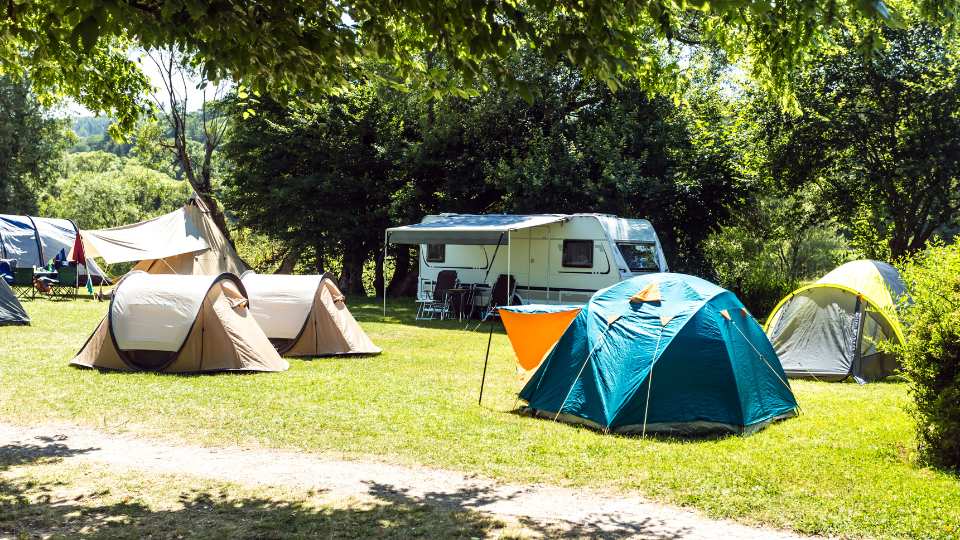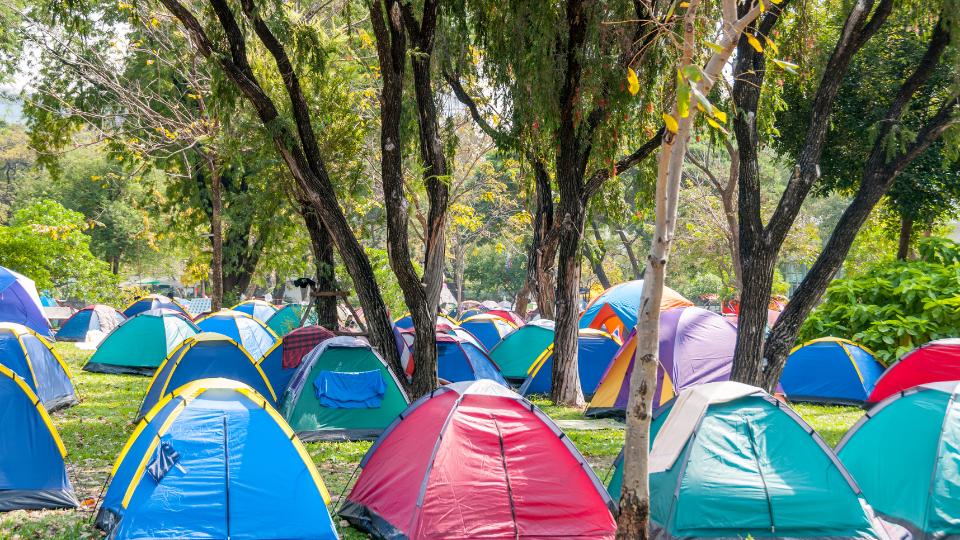
Good campsite waste management is important for keeping your campsite beautiful in preparation for incoming campers!
As more people embrace the joys of camping and outdoor adventures, it’s essential for campsite owners to understand how to manage waste responsibly.
In this guide, we’ll go into everything you need to know about campsite waste, including regulations, disposal methods, how to reduce campsite waste and best practices.
Table of Contents
- What is Campsite Waste?
- Campsite Waste Regulations in the UK
- How to Manage Campsite Waste
- Campsite Waste Disposal Methods
- Interesting Facts and Statistics about Campsite Waste
- Conclusion
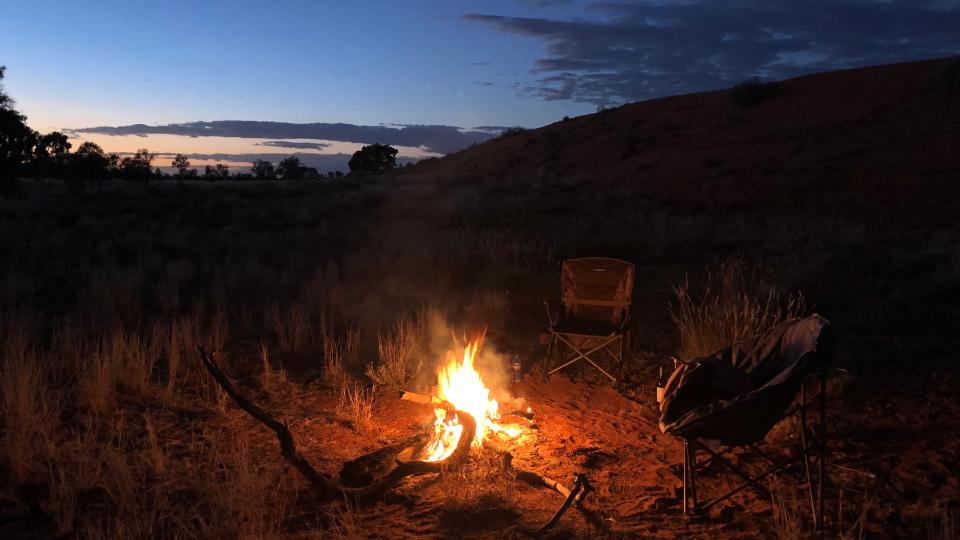
What is Campsite Waste?
Campsite waste refers to the various types of waste generated by campers during their stay at a campsite as well as any waste generated by the business owners or employees.
This includes but is not limited to:
General Waste Disposal
Proper disposal of general waste is essential for maintaining cleanliness and hygiene at campsites.
Examples of common campsite general waste:
- Contaminated food packaging
- Non-recyclable plastic
- Contaminated packaging that can’t be cleaned
- Napkins
- Broken camping equipment
Dry Mixed Recycling
Implementing dry mixed recycling helps reduce landfill waste by diverting recyclable materials from the general waste stream.
Examples of common campsite dry mixed recycling:
- Paper
- Certain types of plastics (e.g., PET bottles, HDPE containers)
- Aluminium cans
Food Waste Management
Managing food waste through composting and proper disposal minimises environmental impact and promotes sustainability.
Examples of common campsite food waste:
- Food scraps
- Biodegradable utensils
- Fruit and vegetable peels
In the summer, it’s particularly important to keep ontop of proper food waste disposal as higher temperatures can increase pests.
Glass Recycling
Recycling glass helps conserve natural resources and reduces energy consumption in the manufacturing process.
Examples of common campsite glass waste:
- Glass bottles (e.g., beverage bottles, sauce jars)
- Glass containers (e.g., condiment jars, spice bottles)
- Broken glass items
Hazardous Waste Disposal
Safe disposal of hazardous waste items is crucial to prevent environmental contamination and ensure camper safety.
Examples of common campsite hazardous waste:
- Batteries
- Propane canisters
- Chemical cleaners
- Pesticides and insecticides
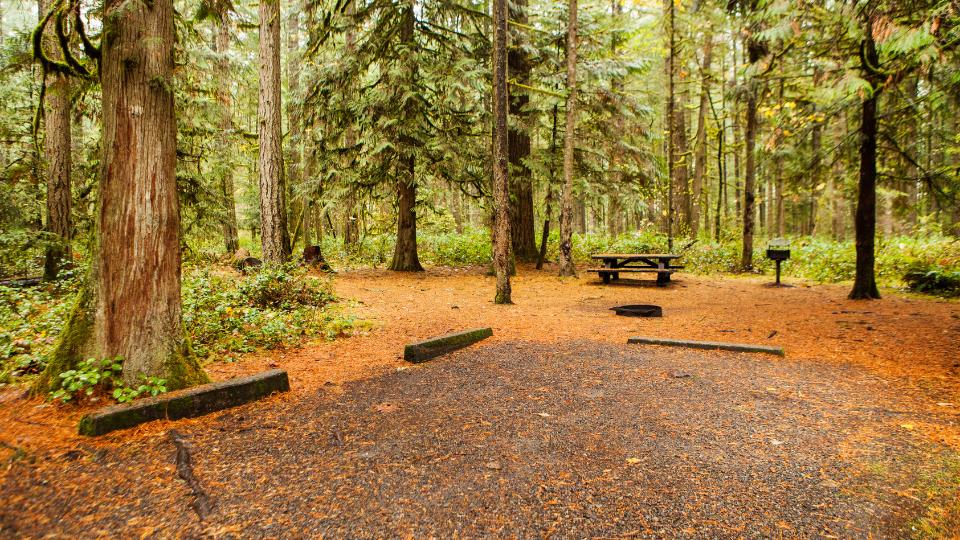
Campsite Waste Regulations in the UK
In the UK, campsite waste management is governed by various regulations to ensure environmental protection and public health. Some key regulations to be aware of include:
Environmental Protection Act 1990
This legislation outlines the duty of care for waste management, including proper disposal and prevention of pollution.
Waste Regulations 2011
These regulations impose requirements for waste management, including segregation, storage, and disposal practices.
Landfill Tax Regulations
Campsites must comply with landfill tax regulations when disposing of waste to landfills.
You can read more in our dedicated guide on landfill tax on our website.
Control of Pollution Regulations 2001
Campsites with oil storage facilities must comply with regulations regarding the prevention of pollution from oil.
Control of Substances Hazardous to Health (COSHH) Regulations 2002
Ensure safe handling, storage, and disposal of hazardous substances commonly found at campsites.
Failure to comply with these regulations can result in fines and penalties, highlighting the importance of adhering to legal requirements.

How to Manage Campsite Waste
Effective campsite waste management involves a combination of strategies aimed at minimising waste generation and maximising recycling and disposal efficiency.
Here are some essential steps:
Waste Auditing
Waste auditing is a critical step in understanding the types and quantities of waste generated at your campsite.
By conducting regular audits, you can identify trends, areas for improvement, and opportunities to reduce waste.
This process involves collecting data on the various waste streams produced, such as general waste, recyclables, and organic waste.
Analysing this information allows you to make informed decisions about waste management strategies and resource allocation.
Waste Reduction
Encouraging campers to reduce waste is an essential aspect of sustainable waste management.
By promoting the use of reusable containers, utensils, and water bottles, you can minimise the amount of single-use packaging and disposable items brought to the campsite.
Consider implementing initiatives such as providing water refill stations, offering incentives for using reusable products, and educating campers about the environmental impact of their consumption habits.
Empowering campers to make eco-friendly choices can significantly reduce the overall waste footprint of your campsite.
Reuse Initiatives
Implementing a system for collecting and redistributing reusable items left behind by campers can help extend the lifespan of these materials and reduce waste.
Consider setting up designated areas where campers can donate or exchange gently used items such as tents, camping gear, and clothing.
Organise community swap events or donation drives to facilitate the redistribution of reusable resources.
By promoting a culture of reuse and sharing, you can divert valuable materials from the waste stream and promote sustainability within your campsite community.
Recycling Programmes
Establishing a good recycling programme is essential for diverting recyclable materials from the general waste stream and reducing landfill waste.
Provide clearly labelled recycling bins for different materials, including paper, cardboard, plastics, and metals.
Educate campers about the importance of proper sorting and disposal of recyclables to minimise contamination and maximise recycling efficiency.
Consider partnering with local recycling facilities or waste management companies to ensure that collected recyclables are processed responsibly and recycled into new products.
Composting Facilities
Establishing composting facilities for organic waste, including food scraps and biodegradable materials, can help divert valuable nutrients from the waste stream and promote soil health.
Set up compost bins or piles in designated areas of the campsite and provide guidance on what materials can be composted.
Educate campers about the benefits of composting and encourage participation through signage, educational materials, and hands-on demonstrations.
Regularly monitor and maintain composting systems to ensure proper decomposition and minimise odours or pests.
Hazardous Waste Management
Safely disposing of hazardous waste items, such as batteries, propane canisters, and chemical cleaners, is essential for protecting human health and the environment.
Develop protocols for the safe storage, handling, and disposal of hazardous materials, in compliance with relevant regulations and guidelines.
Provide clear instructions and designated collection points for campers to dispose of hazardous waste safely.
Consider partnering with local authorities or waste management companies to arrange for proper disposal and recycling of hazardous materials.
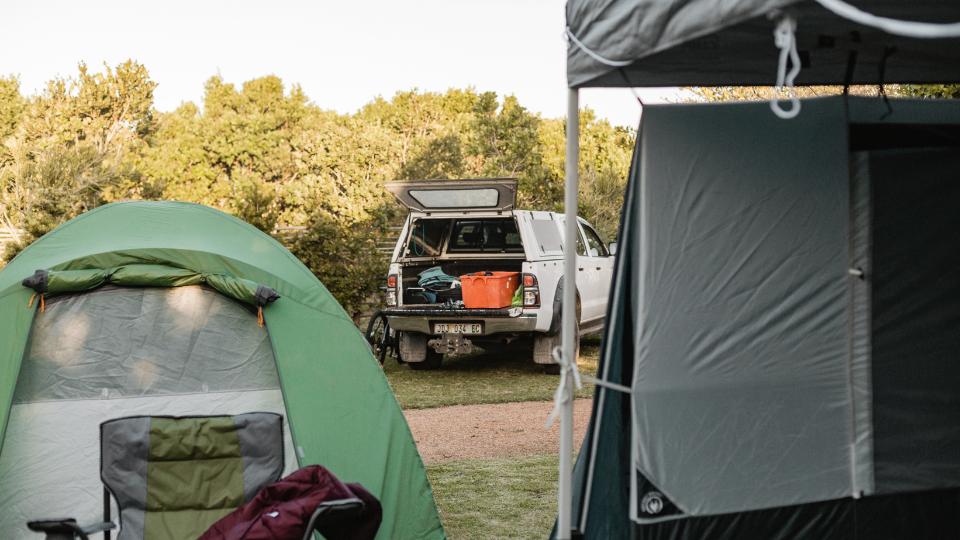
Campsite Waste Disposal Methods
Campsite waste disposal methods vary depending on the type and quantity of waste generated.
Choosing the appropriate disposal method is essential for minimising environmental impact and complying with regulations. Here are some common disposal methods:
Landfill
Non-recyclable and non-compostable waste is typically disposed of in landfills.
Proper waste segregation and packaging are necessary to ensure that landfill-bound waste is handled responsibly.
Recycling
Recyclable materials are sorted and sent to recycling facilities for processing into new products.
Campsites can implement recycling programs to divert recyclable materials from the general waste stream and promote resource conservation.
Composting
Organic waste, such as food scraps and biodegradable materials, can be composted to produce nutrient-rich soil for gardening and landscaping purposes.
Composting facilities can be established to facilitate the decomposition of organic waste and promote soil health.
Incineration
Some waste materials, such as certain types of plastics, can be incinerated to generate energy.
Incineration facilities use controlled combustion processes to convert waste into heat, steam, and electricity, reducing the volume of waste destined for landfills.
Each disposal method has its advantages and considerations, and campsite owners should assess their waste streams to determine the most suitable approach for managing waste responsibly.
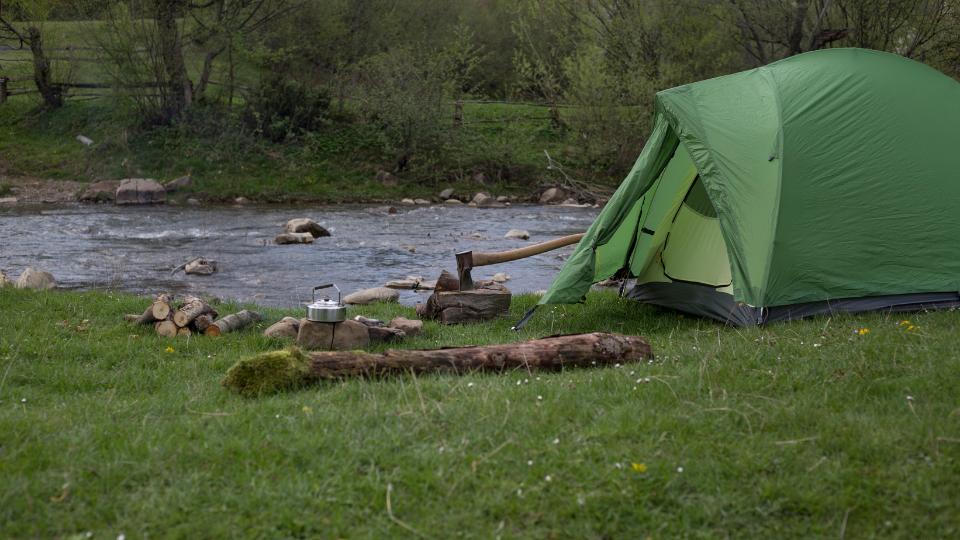
Interesting Facts and Statistics about Campsite Waste
- Two million pieces of litter are dropped in the UK every day.
- In the UK, camping and caravanning trips contribute over £2.5 billion to the economy annually.
- Over 8.7 million single-use plastic bottles are discarded at UK campsites annually, highlighting the environmental impact of disposable packaging.
- £2,000,000 worth of tents, sleeping bags and other camping equipment are abandoned across the UK each year
- 1 in 5 people in the UK have been camping
- In the UK, spending on camping trips increased to £2.7 billion in 2021 – 80% more than in 2020.
- 45% of Millennials and 44% of Gen Z expressed the highest level of interest among prospective new campers.
- 2022 had the highest booking rate for campsites in any year ever.
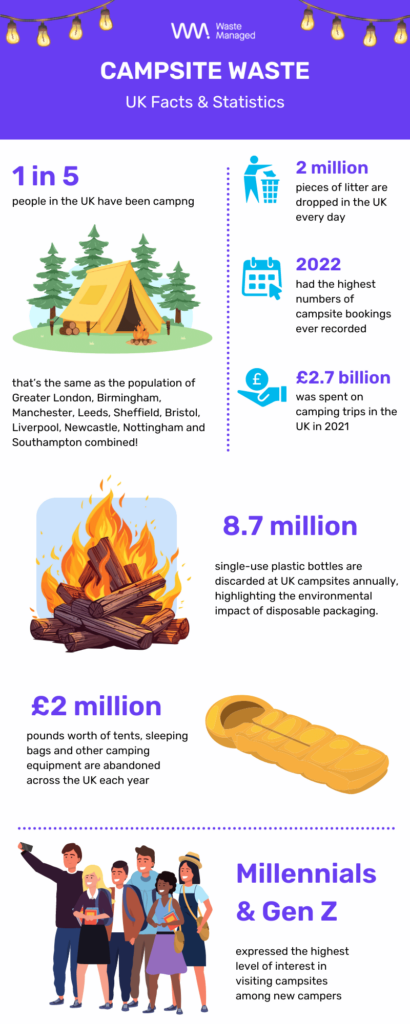
Conclusion
Managing waste at campsites is crucial and involves careful planning, following rules, and teamwork from owners and visitors.
With smart strategies like reducing waste, recycling, and proper disposal, we can keep campsites beautiful and sustainable for future generations.

